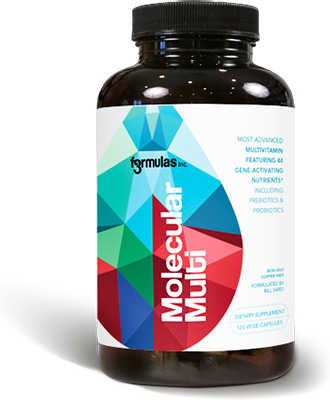The Biggest Mistake In Taking Dietary Supplements Is Not Taking A Comprehensive Multivitamin
Nov 29 2016
For some time now modern medicine has been advocating a polypill, a pill that would prevent cardiovascular disease by the delivery of a combination low-dose statin cholesterol blocker, folic acid, and three types of blood pressure-lowering drugs. However, only 1 in 4 high-risk subjects continued to take a poly pill in a large trial. [World Heart Federation 2014] Somehow the polypill or the idea of prevention has just never gotten off the ground. [PLoS One 2015] Modern medicine just can’t put itself out of business. So preventive medicine is just a charade.
Now the natural medicine equivalent to the polypill is the multivitamin. Oh, I’m not talking about those hamster vitamins like Centrum and One-A-Day that provide 100% of the Recommended Daily Allowance and that cost less than $10/month. Science-based combinations (exceeding the RDA) of nutrients have been demonstrated to be of value. For example, a combination of magnesium, probiotics and vitamins was shown to significantly reduce psychological stress and fatigue. [Panminerva Medicine June 16, 2016]
Multivitamins, by virtue of the fact they provide vitamin B12, B6 and folic acid, reduce undesirably high levels of homocysteine that is a cause of mental depression. [Journal Psychopharmacology 2005] This is well known but not often explained to the public. [Nutrients Oct 30, 2015]
Doctors don’t want to prescribe vitamins, even if a deficiency is that primary cause of depression. So they prescribe Abilify, Cymbalta, Elavil, Lexapro, Wellbutrin, Paxil. One in ten Americans now takes an antidepressant drug. They ought to feel duped. But once those antidepressant drugs become their friend, it is difficult to tear them away from these pills. No doctor is sanctioned for placing a patient with high homocysteine levels on an inappropriate antidepressant drug instead of B vitamins. Doctors get paid a consultation fee for prescribing drugs, not vitamins.
It is interesting to search the entire National Library of Medicine PUBMED library to find there is not a single published report comparing a polypill with a multivitamin. There are 289 published reports that mention polypill and 2336 that mention multivitamin, but none that mention both or compare one against the other.
While there is a lot of criticism pointed at dietary supplements, a newly published study was intriguing. A study of 18,530 male physicians over a mean of 12.2 years did not reveal a significant reduction in heart and blood vessel disease event (strokes, heart attacks). However, a subset of physicians who took a multivitamin for over 20+ years experienced a whopping 44% reduction in risk for these events. [Journal Nutrition June 2016] Yet, from the different quarter of the medical profession, we read a demand to “stop wasting money on vitamin and mineral supplements.” [Annals Internal Medicine 2013]
Now that we live in an era of knowledge about human genes, researcher Michael Fenech claims a Recommended Daily Allowance needs to be established that would stabilize and protect our packaged DNA into chromosomes. When cells in the human body undergo division in the process of regeneration, a shortage of B vitamins may result in a broken or damaged chromosome creating a secondary small abnormal nucleus in the cell (called micronucleus). The nucleus contains all the genetic material that directs normal cell function and reproduction. Measuring the number of small nuclei in a cell is a way of measuring chromosomal damage. [National Toxicology Program] Dr. Fenech says we should focus attention on defining optimal requirements of key minerals and vitamins for prevention of damage to both DNA. [Mutation Research 2001] Dr. Fenech put this to a test and supplemented the diet of healthy middle-aged adults and found those individuals with the highest intake of vitamins A, E, folate, niacin had -28% to -49% less unstable DNA. [Carcinogenesis 2005]
A study conducted years ago showed that many patients taking a B vitamin complex were still nutrient deficient. The reason given was lack of stomach acid and poor absorption. About 1-3 liters of gastric juice is secreted daily. A person over age 40 has a 90% probability of having low stomach acid. This means the diet will be woefully inadequate to meet your nutritional needs based upon lack of absorption alone. You will need higher-dosed vitamins to compensate for the lack of absorption.
Now, where to find a comprehensive multivitamin?

